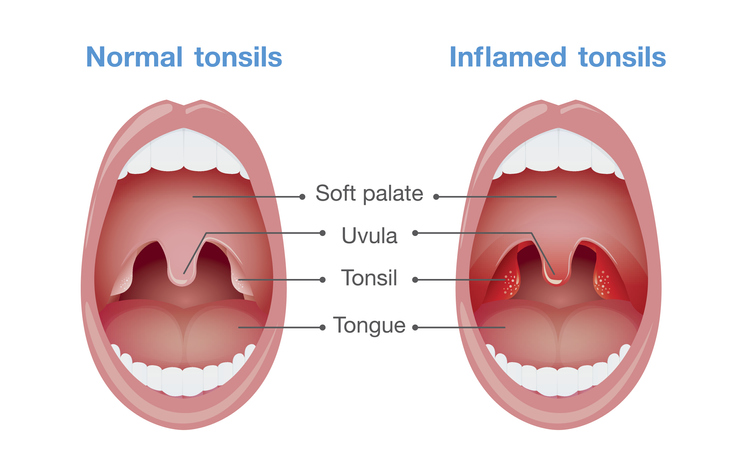Tonsils and Adenoids
Tonsils
Tonsils are fleshy pads located at each side of the back of the throat. Tonsils are an essential part of the immune system, preventing germs from entering the mouth or nose.
Tonsillitis is an infection of your tonsils that causes inflammation and swelling of the tonsils. This can be severe enough to make it hard to breathe through your mouth. Other symptoms include:

- Throat pain or tenderness
- Fever
- Red tonsils
- A white or yellow coating on your tonsils
- Painful blisters or ulcers on your throat
- Headache
- Loss of appetite
- Ear pain
- Trouble swallowing
- Swollen glands in your neck or jaw
- Fever and chills
- Bad breath
- A scratchy or muffled voice
- Stiff neck
Sometimes along with tonsillitis, the adenoids are also swollen.
Adenoids
Adenoids are a patch of tissue that sits at the very back of the nasal passage. Like tonsils, adenoids help keep the body healthy by trapping harmful bacteria and viruses that we breathe in or swallow.
An enlarged adenoid may cause snoring, mouth breathing, persistent congestion, nasal drainage, ear problems, sinusitis, and “nasal” voice quality (the way you sound when you have a cold).
Coblation
Unlike traditional surgical tonsillectomy procedures, coblation combines radiofrequency energy with natural saline to remove tissue quickly and precisely, preserving the surrounding tissue. The coblation process is done under anesthesia. Coblation results in less pain after surgery and quicker recoveries.
It is common for most patients who have undergone a coblation tonsillectomy to feel better than expected following their surgery, resuming a normal diet and activities within a few days.
Coblation has been used in more than 6 million procedures by surgeons in ear, nose, and throat, and other medical specialties.
